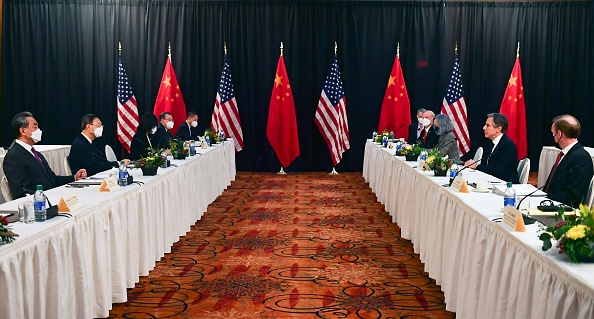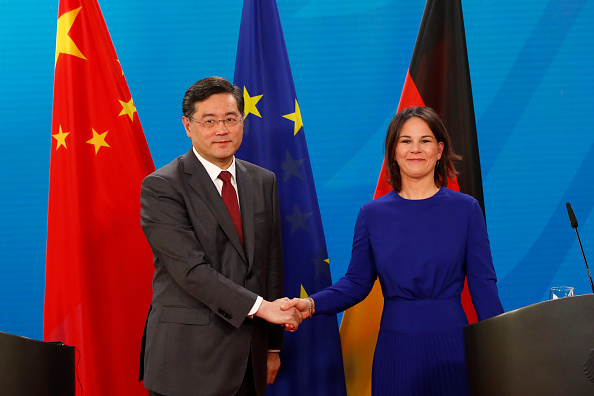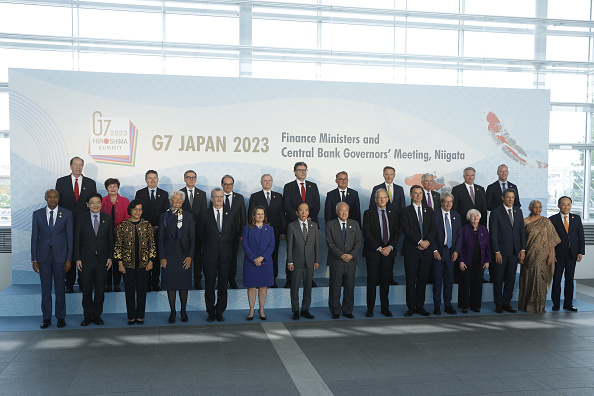
 Meeting Halfway
Meeting HalfwaySeveral high-level meetings between U.S. and Chinese officials signal a possible thawing of ties between the two superpowers.
In his first public meeting with an American official since the shooting down of a Chinese surveillance balloon, Foreign Minister Qin Gang told U.S. Ambassador to China Nicholas Burns that the top priority for the two countries is to prevent a "downward spiral" in U.S.-China relations.
However, Qin accused the U.S of a "series of erroneous words and deeds" that had put the relationship "on cold ice" and called on Washington to "meet China halfway."
"The top priority is to stabilize China-U.S. relations, avoid a downward spiral, and prevent accidents between China and the United States. This should be the most basic consensus and a bottom line for countries to keep, especially two major countries," Qin said.
Burns posted a brief update on his official Twitter account after the meeting saying that "I met State Councilor and Foreign Minister Qin Gang today. We discussed challenges in the U.S.-China relationship and the necessity of stabilizing ties and expanding high-level communication."
Following the meeting between Qin and Burns, White House National Security Adviser Jake Sullivan and his Chinese counterpart, Wang Yi, held discussions in Vienna where they discussed global security issues and Russia's war in Ukraine.
The White House described the meeting between Biden's national security advisor Jake Sullivan and China's top diplomat Wang Yi as "candid, substantive and constructive," and said it aims to keep up open communication with China.
China's state news agency Xinhua reported that Taiwan was high on the agenda during the talks, writing that "Wang Yi comprehensively elaborated on China's solemn position on the Taiwan issue."
Learn more in "The Right Way Forward for U.S.-China Relations," an interview with Wang Jisi, a professor at Peking University.
 De-Risking
De-RiskingSeveral high-profile Chinese officials visited Europe this week, with State Councilor and Foreign Minister Qin Gang in Germany, France and Norway and Chinese Vice President Han Zheng touching down in Portugal and the Netherlands. The visits signal that China is continuing its recent diplomatic push and seeking ways to foster greater cooperation with the EU despite the geopolitical headwinds at play.
The meetings are occurring against a backdrop of suspicion in the EU that China is a systemic rival on the global stage instead of an ally and economic partner. While there is little interest in decoupling from the economic and geopolitical weight of China, the EU is instead proposing "de-risking" its relations to avoid becoming too dependent on China.
In France, Qin Gang said China is ready to advance several areas of cooperation identified by Presidents Macron and Xi during their recent meeting in Beijing. Qin indicated a desire to boost cooperation on international affairs and work together to "tackle global challenges", as well as expand exchanges at all levels.
"China has always seen Europe as a comprehensive strategic partner and has always shown clear support for Europe's efforts to strengthen strategic autonomy and its active role on the international stage," Qin said.
In Germany, Qin warned his German counterpart Annalena Baerbock that Beijing would react strongly if the EU were to sanction Chinese companies over their potential role in assisting Russia's war in Ukraine.
Baerbock said that Berlin wants to work in partnership with China "everywhere it's possible" but that it would be naive to ignore the risk of ending up in a position of reliance, including on security issues.
In the Netherlands, Chinese Vice President Han Zheng met both the king and the prime minister, and discussed cooperation possibilities regarding trade and sustainable development, including the fight against climate change and water management.
Learn more in, "The Yin and Yang of the China - EU Geopolitical Relationship," by Sebastian Contin Trillo-Figueroa, an EU consultant and AsiaGlobal Fellow at Asia Global Institute, HKU.
 A Tricky Trade-Off
A Tricky Trade-OffIn preparation for the upcoming G7 leaders' summit in Hiroshima, finance heads from G7 countries convened in Niigata, Japan, this week to deliberate on a range of measures aimed at responding to China's global economic influence. These preliminary discussions set the stage for the upcoming summit and involved an exploration of potential targeted controls on investments in China.
While some countries advocated for robust measures to protect domestic industries and combat what they view as unfair competition, others prioritized economic cooperation with China to maintain global trade and investment flows.
However, domestic political implications further complicate decision-making, considering potential negative impacts on economies and diplomatic relations with China. Additionally, China's potential backlash and concerns about containment efforts may lead to retaliatory measures, adding complexity to the situation.
The United States is leading in advocating for stronger actions against China, with Treasury Secretary Janet Yellen highlighting concerns among G7 economies regarding China's "economic coercion."
In response, the Chinese Foreign Ministry said that "when it comes to economic coercion, the first one that should be condemned is probably the U.S.," pointing out that Washington has taken "unfair and discriminatory measures against foreign companies," violating the principles of market economy and fair competition.
As they prepare for the summit, G7 leaders hope to strike a delicate balance navigating the trade-off between implementing tough measures against China and maintaining economic interests and growth, as well as geopolitical stability.
Prepared by China-US Focus editorial teams in Hong Kong and New York, this weekly newsletter offers you snap shots of latest trends and developments emerging from China every week, while adding a dose of historical perspective.
- 2023-05-05 Golden Week
- 2023-04-28 Diplomatic Dance
- 2023-04-21 Constructive and Fair
- 2023-04-14 Shoulder-to-Shoulder
- 2023-04-07 Push and Pull
- 2023-03-31 Tsai in Transit
- 2023-03-24 A Changing World
- 2023-03-17 Peacemaker Xi
- 2023-03-10 Party Time
- 2023-03-03 “An Existential Struggle”
- 2023-02-24 Opposing Worldviews
- 2023-02-17 Ripple Effects
- 2023-02-10 Ballooning Tensions
- 2023-02-03 Hot Air
- 2023-01-27 Spheres of Influence
- 2023-01-20 China's Davos Pitch
- 2023-01-13 Strategic Encounters
- 2023-01-06 Common Challenges
- 2022-12-23
- 2022-12-16 All in On Africa
